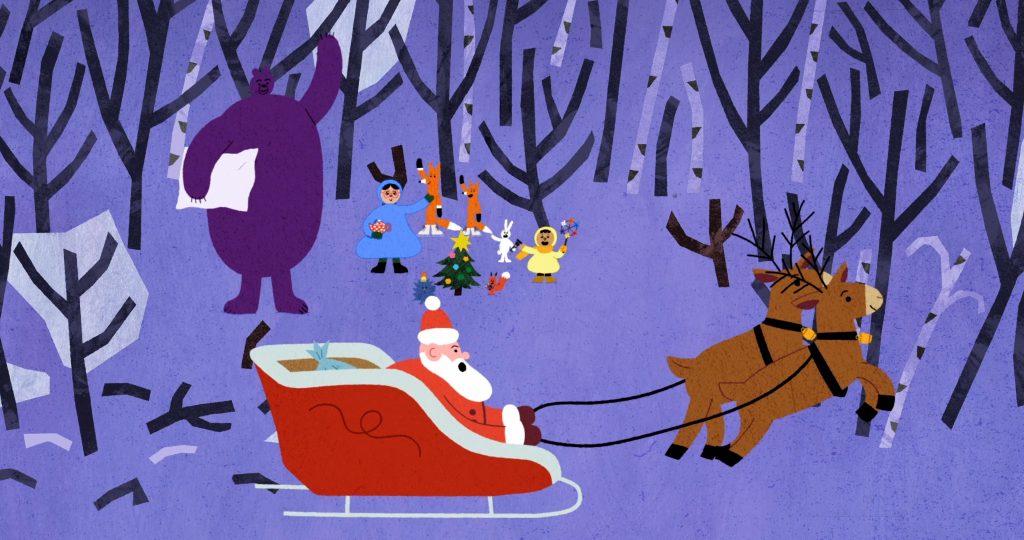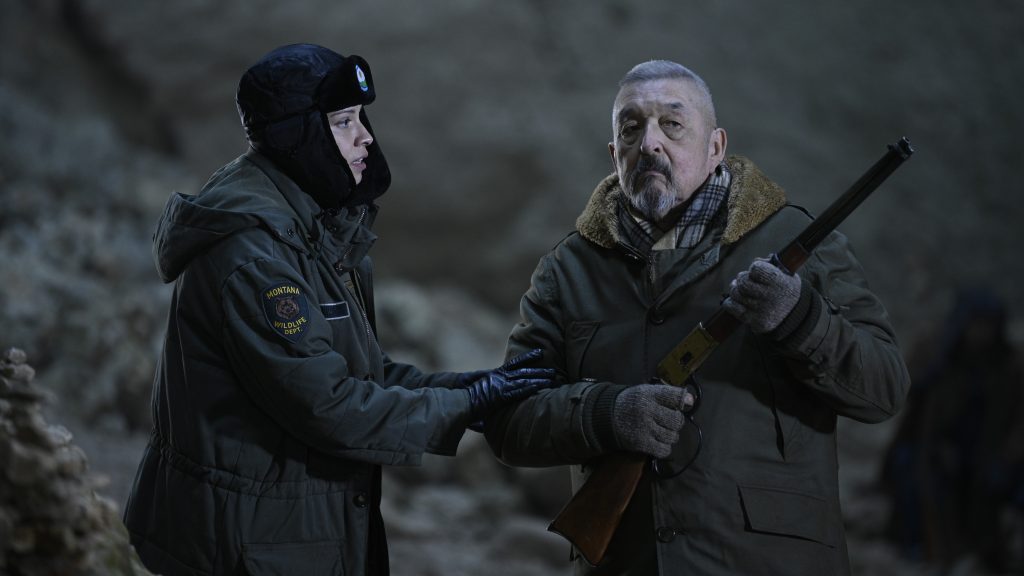Amid the uncertainty of global pandemics and unstable governments, the constant change and decay of humanity, it is comforting to go to the Sundance Film Festival and be reminded that the world still — still! — has so many things to be terrified of.
For example, The Past. The Past can be a real Babadook, if you know what I mean. Resurrection, a gradual and then explosive descent into madness from writer-director Andrew Semans (who should probably be on a watchlist of some kind), stars the great Rebecca Hall as Margaret, a no-nonsense finance ladyboss whose steely reserve withers when a man from her past (Tim Roth) pops back into her life.
Semans doesn’t immediately reveal the backstory, reveling instead in Margaret’s supreme discomfiture (made scarier by our lack of information) and her concern for her teenage daughter, Abbie (Grace Kaufman), who’s going to college in the fall and about whom Margaret has already been feeling apprehensive. Margaret’s impending sense of doom is heightened by an extremely unsettling face-to-face encounter with the man, named David, whose behavior does nothing to reassure her or us.
Much of the film’s power hinges on a seven-minute monologue, mostly presented in one unbroken take, in which Margaret tells her intern, Gwyn (Angela Wong Carbone), the whole story of what happened all those years ago. The tale is sad but common at first, then gets a little stranger, then turns tragic, then turns into sheer WTFery. Here, as in the rest of the film, Hall’s dramatic commitment to the character’s reality is impressive.
Did everything happen the way Margaret says it did? She definitely believes it, and what we know objectively of David does not contradict it; but at the same time, neither character seems entirely sane. There’s a core element of the story and of David’s present-day harassment of Margaret that is totally looney-tunes if it’s a dark joke, insidiously evil if it’s real. The great, sinister fun of the movie is being unsure which it is, and then, when it’s over and everything that is going to be revealed has been revealed, scooping your brains off the floor and putting them back in your head. (Grade: B+)
Speaking of women who have frankly HAD IT with bad men, Fresh offers a somewhat fresh take on the wearingly familiar formula of the damsel held captive. Noa (Daisy Edgar-Jones), a young Portlander with poor dating luck, meets a charming gentleman (Sebastian Stan) at the grocery store. He’s a doctor, he’s very polite, he’s not on social media — he’s perfect!
Well, the fact that we are watching this in the Midnight section at Sundance indicates that Noa is likely mistaken in her glowing assessment of Dr. Steve, and the film provides her with the obligatory best friend (Jojo T. Gibbs) to tell her as much. The only questions are what’s wrong with him and how soon will Noa realize it?
It’s hard to talk about the movie after this point without spoiling anything. The basic premise isn’t revealed until some 35 minutes in — but plotwise, those 35 minutes should have been 10-15. The movie could get to the point faster. Once the point is gotten to, though, it’s good, dark fun, occasionally suspenseful, featuring low-grade perversion and (eventually) a certifiably awesome conclusion.
Fresh was written and directed by women (Lauryn Kahn and Mimi Cave, respectively), probably accounting for how it can dwell in such a sleazy world without being too exploitative. Daisy Edgar-Jones has the necessary kickass energy to avoid seeming too much like a “victim.” Sebastian Stan’s style of goofy menace seems an overt homage to American Psycho, but the scenario also reminded me of The Perfection (which I highly recommend if any of this sounds up your alley). It’s the kind of messed-up movie that won’t mess you up too much. (Grade: B)

Speak No Evil, on the other hand, is the kind that will mess you up a lot. It’s less graphic, but it’s meaner.
It’s sneaky, this one, starting out as an awkward comedy about social manners before turning nasty. While vacationing at an Italian villa, Danish family Bjørn (Morten Burian), Louise (Sidsel Siem Koch), and young Agnes (Liva Forsberg) meet some Dutch equivalents, Patrick (Fedja van Huêt), Karin (Karina Smulders), and young Abel (Marius Damslev). The families pal around together and, a few months later, the Danes accept an invitation to come visit their Dutch vacation friends in Holland.
There aren’t any obvious red flags beyond the fact that the families don’t know each other very well. But it’s just two families hanging out, including their children. As one of Bjørn and Louise’s friends says, “What’s the worst that can happen?”
Well. Danish director Christian Tafdrup (who wrote the screenplay with his brother Mads) takes a tongue-in-cheek approach, toying with our emotions by putting loud, sinister-sounding music over innocuous scenes and by having the Danes feel uncomfortable about staying but equally uncomfortable over the impoliteness of leaving.
You know who does not take a tongue-in-cheek approach to anything? Young Dutch boy Abel, who does not have a tongue. Also worth mentioning: While most of the dialogue is in English (the language the Danes and Dutch have in common), when native tongues are heard the Danish is subtitled but the Dutch usually isn’t. If the Danes don’t know what’s going on, neither do we (unless we speak Dutch, which we do not).
The ghastly final chunk of the movie pays off what has been established; what happens is shocking, but it doesn’t come out of nowhere. Still, the cruelty feels uncalled for somehow, even in a genre where cruelty is acceptable. Your mileage may vary, but I will say that this is for advanced horror fans only. Intermediate viewers may find it crosses a line. (Grade: B-)
Speaking of what a scary place Europe is, I’m a fan of Finnish creature feature Hatching partly because it’s called Hatching and has a credit for “creature effects” in the opening crawl — so for once it’s not a spoiler to tell you what the movie’s about.
Young teen Tinja (Siiri Solalinna), who’s being pushed to perfection in gymnastics by her “ordinary Finnish family” vlogger mom (Sophia Heikkilä), finds an abandoned egg in the woods and takes it home. Soon the egg grows to be approximately Tinja-sized, whereupon it hatches and out comes a big, ugly baby bird-girl. Tinja now has a secret friend, like E.T. They’re psychically linked, too.
First-time feature director Hannah Bergholm, working from a screenplay by Ilja Rautsi, has a grand time with the dark, gross humor that arises as Tinja learns what her daughter/pet is capable of, and with the body horror that arises as the creature evolves. In terms of visual images, Hatching might be the most graphic of the movies discussed so far, but those images are more amusing than unsettling because of the generally good-natured tone. Team Tinja all the way. (Grade: B)
Speaking of young women in precarious situations, Master brings the horror back down to our earthly plane. No bird monsters or Dutch predators or handsome psychopaths or Tim Roth this time. What Black freshman Jasmine Moore (Zoe Renee) faces in her first year at an almost-all-white Massachusetts college is nothing more “supernatural” than good old-fashioned racism. OK, and possibly a ghost-witch.
Red herrings abound in Master as writer-director Mariama Diallo throws everything at the dorm walls to see what sticks. In addition to the subtle (and then overt) racism Jasmine gets from her classmates, there is Gail Bishop (Regina Hall), the school’s first Black housemaster, who finds things eerily awry in her home, and a Black lit professor, Liv Beckman (Amber Gray), who’s weirdly hostile to Jasmine. It’s known that the school’s first Black student, back in the ’60s, hanged herself (in Jasmine’s dorm room!), and that there was an honest-to-goodness witch trial back in the 1600s. To that end, a cult of weirdos still walk around the town wearing 17th-century witch-hanging robes. Is there a good reason for that, or are we just trying to see how many off-kilter things we can fit in the movie? I ask rhetorically.
Zoe Renee and Regina Hall are excellent co-leads, their stories running on parallel tracks without much interaction between them at first. One is compelled to know what will befall them, even as the story gets creakier and more predictable.
Ultimately, the degree of horror you feel may depend on your personal experience with racism. When Get Out was released, many white people (myself included) classified it as more comedy than horror, while many Black viewers saw it the other way around. Master isn’t a comedy at all, but whether it’s “horror” or merely “intense drama” sort of depends on your perspective. We’ll let Regina Hall’s Gail Bishop have the final word: “It’s not ghosts. It’s not supernatural. It’s America.” (Grade: B-)



